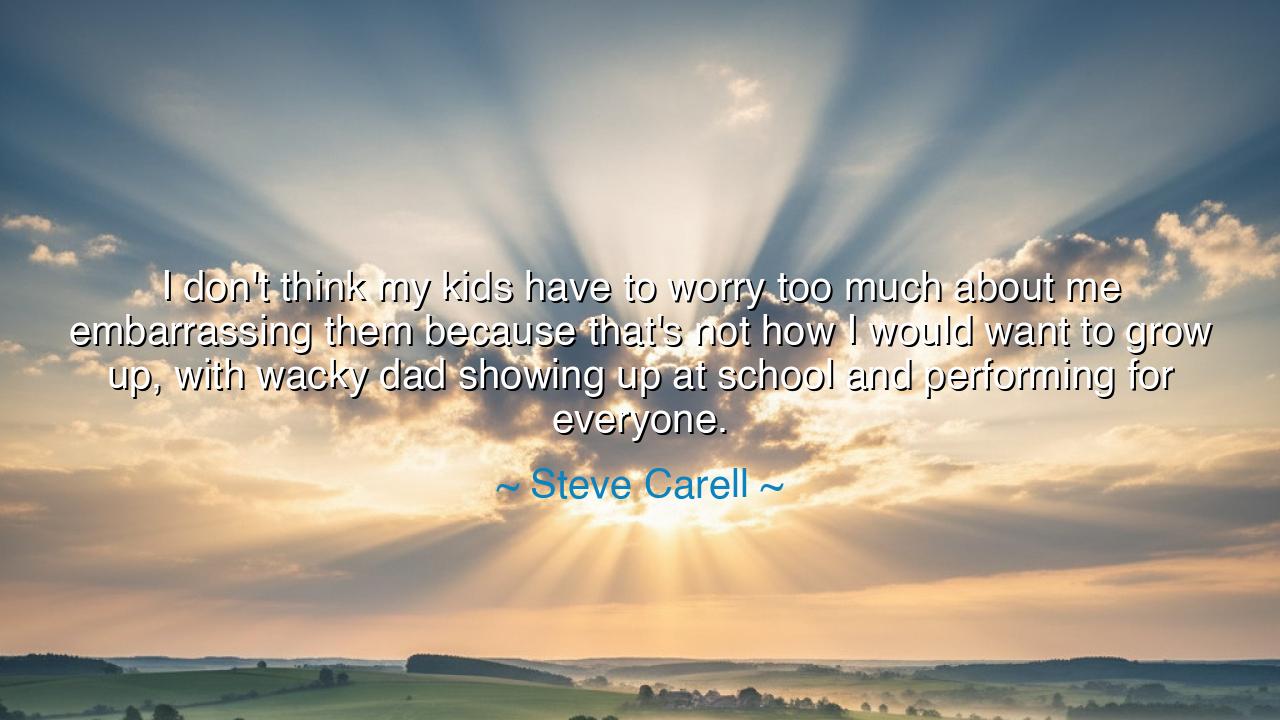
I don't think my kids have to worry too much about me
I don't think my kids have to worry too much about me embarrassing them because that's not how I would want to grow up, with wacky dad showing up at school and performing for everyone.






“I don't think my kids have to worry too much about me embarrassing them because that's not how I would want to grow up, with wacky dad showing up at school and performing for everyone.” — Steve Carell.
Thus spoke Steve Carell, the master of gentle humor and quiet humility, whose laughter on the screen hides the deeper wisdom of a man who understands restraint. In this simple and tender reflection, he speaks not only as a father, but as one who remembers the heart of childhood — that delicate balance between love and independence, affection and dignity. His words carry the warmth of humor but the depth of respect: that the role of a father is not to steal the light from his children’s world, but to make sure that light shines freely upon them.
The origin of this quote comes from an interview in which Carell, known for his comedic brilliance, was asked whether he ever plays the fool in front of his children as he does in his films. His response was thoughtful, even reverent. He spoke as a man who knows that humor, when wielded carelessly, can overshadow rather than uplift. He had lived long enough in the world of performance to understand its power — but also its limits. What he expressed, beneath the jest, was a timeless truth: that love requires awareness, and that even the joy we offer must be measured by the hearts that receive it.
In his words lies a deeper philosophy, one that reaches back to the wisdom of the ancients — the art of moderation. To be a great father, leader, or friend is not merely to give, but to know how much to give, and when. The ancient Greeks called this sophrosyne, the virtue of temperance — the harmony between enthusiasm and restraint. A father’s love, untempered, can suffocate; too little, and it can wound. Carell’s wisdom shows that to nurture others, one must sometimes step aside, allowing them the dignity of their own space, their own identity, their own stage upon which to grow.
This principle is echoed through history. Consider Marcus Aurelius, emperor of Rome and philosopher of calm strength. Though he ruled the mightiest empire on earth, he refused to make his son live beneath the shadow of his greatness. In his meditations, he wrote not of triumphs but of humility — reminding himself that every man, no matter how powerful, must respect the independence of others, especially of those he loves. So too does Steve Carell, in his quiet way, remind us that true greatness in a parent is not found in being admired, but in making room for the next generation to rise without fear or embarrassment.
There is also an unspoken tenderness in Carell’s words — a compassion born of remembrance. He recalls his own youth, and the awkwardness that every child knows when the world feels too large and too watchful. To grow up is to carve one’s own identity, and few things wound more subtly than being overshadowed by those we adore. By saying he would not wish to be a “wacky dad,” Carell speaks of empathy — the ability to remember oneself as a child and to parent with that memory alive. This, too, is an ancient virtue: to understand before commanding, to feel before acting.
And yet, this is not a rejection of joy or playfulness. It is a call to wisdom in love. The laughter of a father, when shared rightly, becomes the music of home; but when imposed, it becomes noise. Carell’s insight teaches that love is not measured by display, but by attentiveness — by knowing when to stand before one’s children, and when to stand beside them. To love deeply is to guide without spectacle, to support without intrusion, and to let one’s presence be felt even in silence.
So let this be the lesson passed down: Love is not the art of being seen, but the art of seeing. A father’s task is not to entertain his children, but to understand them; not to make them laugh at him, but to help them smile at themselves. In friendship, in leadership, in every bond of care, remember this balance — to offer your light without eclipsing another’s dawn.
Thus, as Steve Carell teaches through both his humor and his humility, greatness in love lies not in performance, but in presence. Be joyful, but not overbearing. Be kind, but not controlling. Let those you love feel free to grow beneath your gaze, unashamed and unafraid. For the truest sign of wisdom is not to command attention, but to inspire confidence — and the noblest heart is the one that gives others room to shine.






AAdministratorAdministrator
Welcome, honored guests. Please leave a comment, we will respond soon